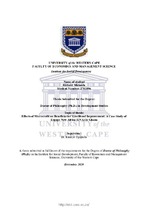Effects of Microcredit on Beneficiaries’ Livelihood Improvement: A Case Study of Engage Now Africa (ENA) In Ghana
Abstract
In Ghana, the number of people living in extreme poverty has reduced. Yet the poverty rate is
currently 24.2 %, which is still high considering that Ghana is a lower middle-income country
(Emmanuel, Frempong, Opareh & Rose, 2015; 35). In Ghana, the poor are classified in two
groups: “ 1) … those who live above an upper line of GHC 1314.00 per day which is
equivalent to US $ 1.83, and; 2) those within a lower poverty line of GHC 729.05 equivalent
to US $ 1.03 a day…” (Emmanuel, Frempong, Opareh & Rose, 2015; 35). Those who “…
live above the upper line of GHC 1314.00 are considered as non-poor, whereas those with a
consumption expenditure equivalent or below GHC 729.05 a lower poverty line are in
absolute poverty or living in extreme poverty…” (Emmanuel et al., 2015).
In Ghana, Yaidoo and Kalaiah (2018) agree that microcredit programs are a neoliberal ploy
that keep poor people in a perpetual state of poverty. Most microcredit beneficiaries are
located in the rural areas and majority are the lowest income earners of the employed
population. Microcredit should ordinarily have a broader range of empowerment services, yet
the Ghana microcredit programs do not have this. Microcredit in Ghana has become a debt
trap and its benefits to the poor is illusory (Yaidoo and Kalaiah, 2018). Most microcredits
have high interest rates and seek to profit operations which had created a situation where
microcredits are an additional burden to the people, impacting negatively on their livelihood
(Yaidoo and Kalaiah, 2018). Further, Yaidoo and Kalaiah (2018) pinpointed that in Ghana,
by observing the crippling consequences of debt burden on countries (such as Ghana who
opted for the Highly Indebted Poor Country status in 2002), the world financial crisis in
2007/08, and cases of high default in repayment of debt, it would make sense to adopt a more
impactful approach to microcredit. In that other role, players are needed to fill the gap with
intervention resulting in improving people’s livelihood.
This study aimed to empirically access the effect of microcredit on beneficiaries’ livelihood
improvement. The study was conducted in four regions of Ghana, with the main objective to
find out whether the Self-Supported Assistant Programme (SSAP) microcredit has improved
the livelihood of its beneficiaries. The specific objectives of the study were to: i) evaluate the
Beneficiaries Livelihoods Status as per their asset accumulation, voluntary saving,
capabilities and frequency of loan repayment, and; ii) to estimate the effects of Demographic
+ Socioeconomic + Loan T&Cs Variables (financial training + loan interest rates + loan
monitoring) on Beneficiaries Livelihoods Improvement (asset accumulation, voluntary
saving, capabilities).

